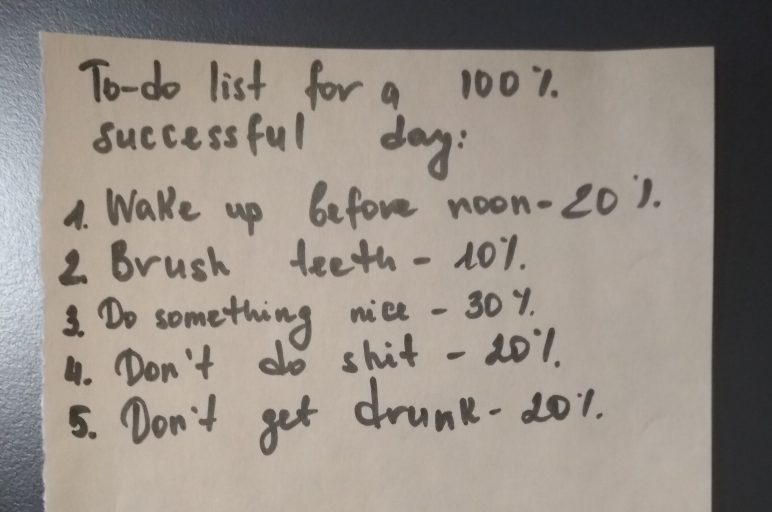I watched all the effective time management TED talks but none of the methods described worked for me. To find out why I had this abnormal inability to respect deadlines, I decided to dig deeper. Millennials, to whom I refer myself, like to find reasons for their weaknesses in their childhood and subconscious. And so did I.
I found out soon that my deadline management problems were the result of my self-sabotaging habits. My desire to leave every task until the last night appeared due to my fear. I believed that if I put all my effort into performing the best way possible and fail, that would mean I’m a total wreck.
Let me give an example. Imagine there is a painting you want to draw. But you are so afraid to screw up that your subconscious doesn’t allow you to do your best. When some inconveniences appear, even if it is you who create them, your ego is secure. Dead-afraid to fail, your brain makes you believe you are still capable of creating a masterpiece. It’s just that for the moment, luck is not on your side.
Some of us avoid managing priorities and deadlines because we are afraid to be successful. Our subconscious is so used to its “I’m-just-a-loser” comfort zone that it sabotages all our logical attempts to change something.
We don’t know what our lives might have looked like if we were A-students, as we’ve never been ones. But our brain knows how to be a C-student, and as it’s afraid of new experiences, it will do its best to never let our grades go up.
This is the deep reason why you still postpone your homework until the last moment. The bad news is that if you don’t accept this inconvenient truth, no time management tips will ever help you. Except for these ones.

Clown by Pixabay from Pexels
1) Let’s play a game
Create a rewards-and-penalties table. But be honest with yourself when choosing what you like to have as a reward and what you hate to do as your punishment.
Make a plan to complete a large task by dividing it into 10 parts. Promise yourself to complete those 10 parts over ten days. Assign yourself a punishment for every day you’ve failed to follow your plan. It can be a monetary penalty, for example.
Choose a charity organization whose principles or ideas you don’t share and donate some money to it every day you postpone completing your task or fail to follow your plan. Treat yourself every day you succeed. With junk food, computer games, gym sessions, a new dress, and whatnot.

Dominant by Pixabay from Pexels
2) Find yourself a mentor
This is the best tool for time management for students and people with no skills in self-organization. Getting used to being pushed by someone might result in the formation of “muscle memory” which might help you in your future without someone standing behind your back.
Mentors and tutors might cost you a penny, but you always can get a person who has a demand for control and ask him or her to keep an eye on your work. This can be your parent, a friend, or even a raggedy-looking plush toy.

Imperfection by Jack Hawley from Pexels
3) Refrain from perfection
If you want to demonstrate good time management skills, get used to the fact that an average perfectionist spends 80% of his or her time on 20% of improvements to the 80%-ready item on which only 20% of the time was spent before.
Also, remember there is a difference between striving for perfection in working with the project of your life and your desire to present an ideal piece when it is not needed. You can feel the difference by analyzing your emotions towards a task. Does it make you feel anxious and miserable or making every detail perfect is a kind of meditation for you that helps you to keep your peace of mind?
In most cases, you don’t have to do something in “the best way,” as the level that is demanded is “good enough.” This simple truth might dramatically help students with their homework and essays. Don’t spend your whole weekend trying to make a masterpiece of one essay if there are still six papers to write. Remember that perfectionism is just another type of procrastination.
4) Do things you don’t want to do first
There is a popular division of tasks into four categories:
- Urgent and important
- Urgent and unimportant
- Not urgent but important
- Not urgent and not important
Coaches on self-development offer to complete them correspondingly, starting from the first category and up to the fourth.
This method never worked for me, as there always was a task I wished to disappear with all my heart. And it made me spend hours perfecting more interesting tasks, rejoicing in a cup of something, or punishing myself for laziness by polishing a bathroom. Alas, the only way to dispose of such an assignment is by checking it off from the to-do list by completing it. Do the ugly, boring, numb, pointless, and cursed task first.
Wrapping up
All these methods combined still help me with my time management even though I’m not a student anymore. But sometimes we all have below-average self-esteem and productivity levels. And that’s okay. Don’t get into self-shaming and try to praise yourself anyway. Give yourself points for every task you’ve managed to fulfill in one day and see how great you performed by checking out the percentage of the plan you’ve succeeded to complete.





